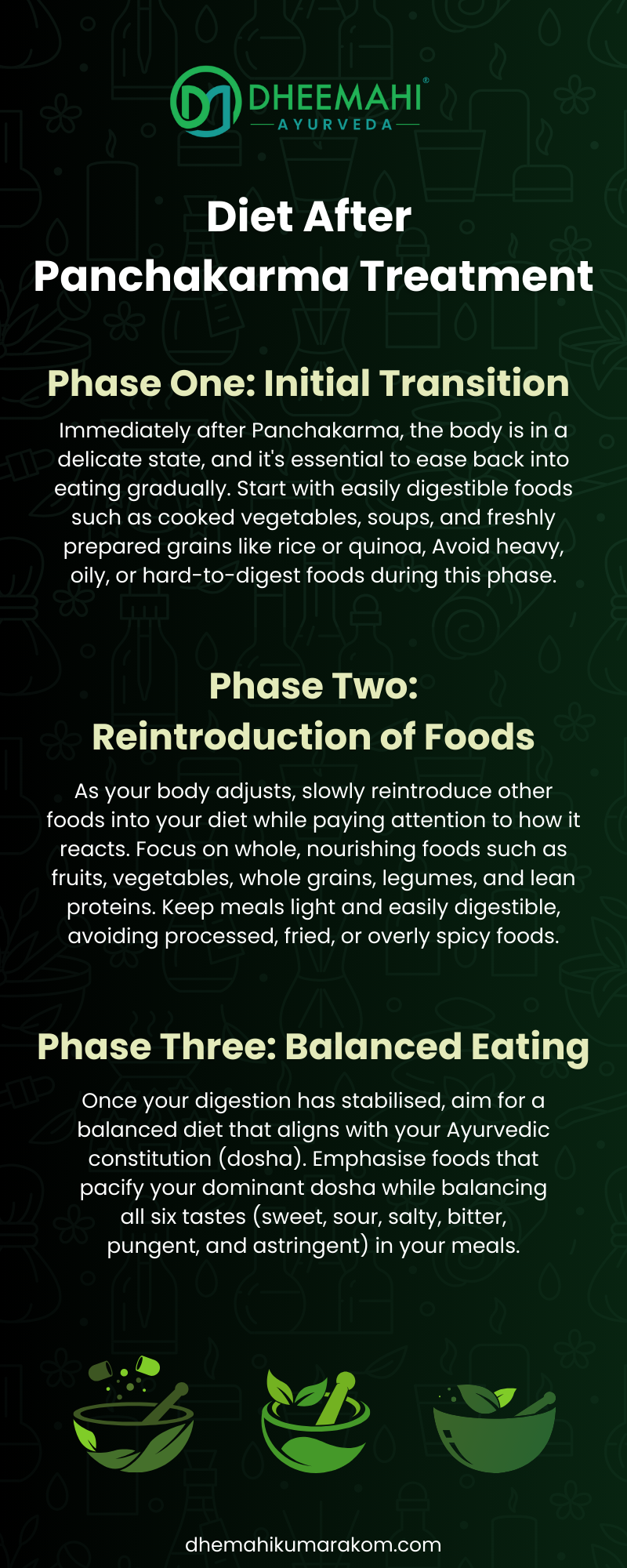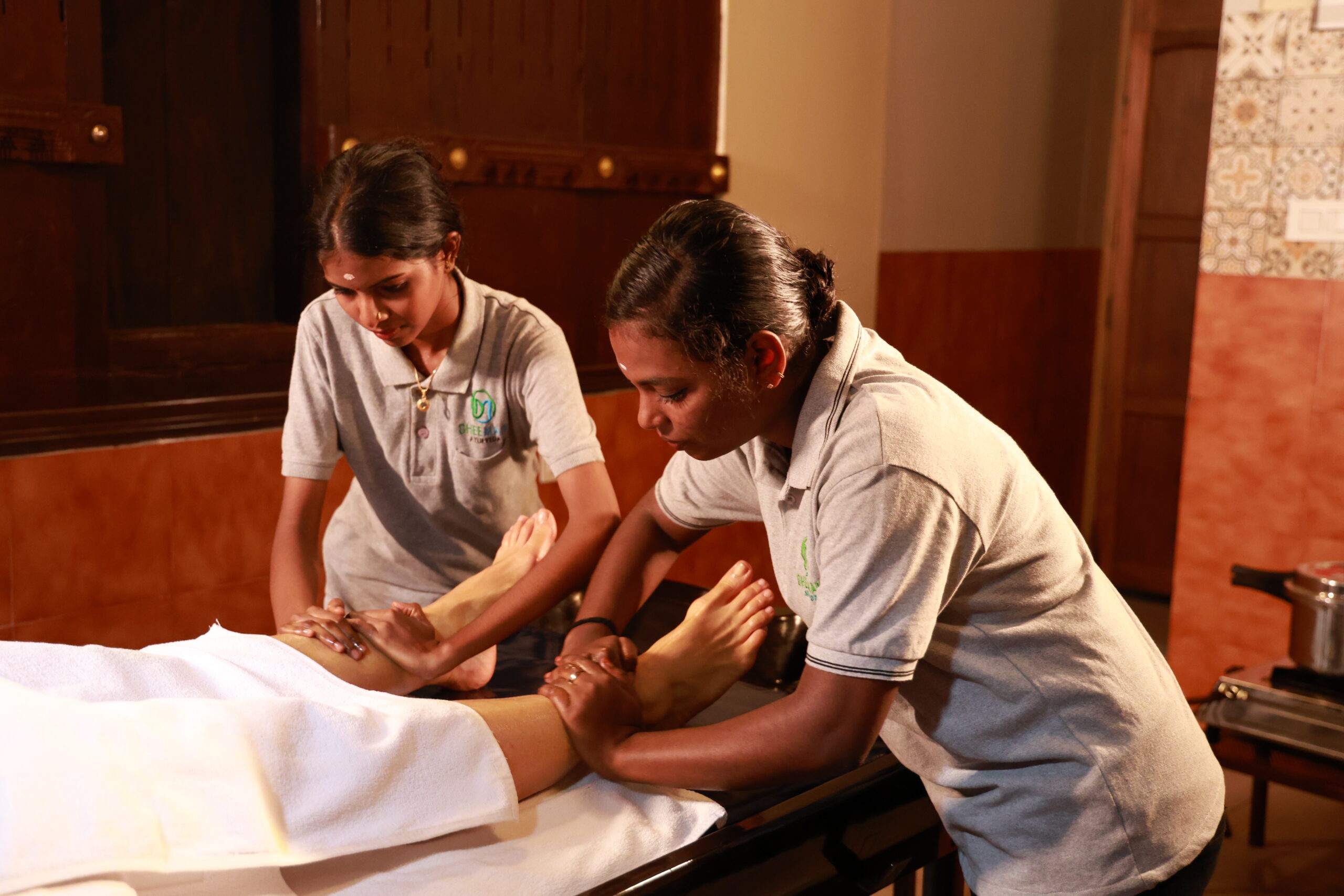What Happens After Panchakarma?
Dr. Amritha B.A.M.S
After undergoing the transformative Ayurvedic detoxification process known as Panchakarma, individuals often find themselves in a state of renewed vitality and clarity.
Immediately after completing Panchakarma, it’s essential to gradually ease back into regular activities. The body undergoes significant purification during the process, and sudden exertion or exposure to stress can undermine its rejuvenation.
Ayurvedic doctors typically recommend rest and gentle activities following Panchakarma to allow the body to adjust and fully recover.
Diet after panchakarma treatment
Phase One: Initial Transition
Immediately after Panchakarma, the body is in a delicate state, and it’s essential to ease back into eating gradually. Start with easily digestible foods such as cooked vegetables, soups, and freshly prepared grains like rice or quinoa. Avoid heavy, oily, or hard-to-digest foods during this phase.
Phase Two: Reintroduction of Foods
As your body adjusts, slowly reintroduce other foods into your diet while paying attention to how it reacts. Focus on whole, nourishing foods such as fruits, vegetables, whole grains, legumes, and lean proteins. Keep meals light and easily digestible, avoiding processed, fried, or overly spicy foods.
Phase Three: Balanced Eating
Once your digestion has stabilised, aim for a balanced diet that aligns with your Ayurvedic constitution (dosha). Emphasise foods that pacify your dominant dosha while balancing all six tastes (sweet, sour, salty, bitter, pungent, and astringent) in your meals.
Foods to Emphasize:
Fresh fruits and vegetables: Rich in vitamins, minerals, and antioxidants, these foods support overall health and vitality.
Whole grains: Opt for nourishing grains like rice, quinoa, oats, and barley, which provide sustained energy and promote digestive health.
Healthy fats: Include sources of healthy fats such as ghee, olive oil, avocados, and nuts in moderation to support brain function and hormone balance.
Lean proteins: Incorporate lean proteins like tofu, tempeh, legumes, and small servings of high-quality animal proteins if desired to support muscle repair and growth.
Herbs and spices: Enhance the flavour and therapeutic properties of your meals with Ayurvedic herbs and spices such as turmeric, ginger, cumin, coriander, and fenugreek.
Foods to Limit:
Processed foods: Minimize intake of processed, packaged, and refined foods, which can disrupt digestion and contribute to inflammation.
Heavy and greasy foods: Avoid heavy, greasy, and deep-fried foods, as they can overwhelm the digestive system and lead to sluggishness.
Excessive sugar and caffeine: Limit consumption of sugary snacks, desserts, and caffeinated beverages, as they can disrupt blood sugar levels and energy balance.
Raw and cold foods: Favor warm, cooked, and freshly prepared meals over raw and cold foods, which can hinder digestive fire and nutrient absorption.
Hydration:
Stay hydrated by drinking plenty of warm water throughout the day, preferably sipping slowly between meals to support digestion. Herbal teas such as ginger tea or digestive blends can aid digestion and promote detoxification.
Mindful Eating:
Practice mindful eating by paying attention to hunger and fullness cues, chewing food thoroughly, and savouring each bite. Avoid overeating and cultivate a sense of gratitude for the nourishment your food provides.
Panchakarma at Dheemahi
Dheemahi Ayurveda – one of the best ayurveda resort in kerala is dedicated to prioritizing patient health and well-being through a rich tradition of Ayurvedic wisdom passed down through five generations. Our team comprises expert doctors who are committed to your health journey.
This Ayurvedic therapy facilitates detoxification and a profound rebalancing of our entire being through its five-fold therapeutic actions. With its personalized treatments and emphasis on harmonizing the body’s doshas, Panchakarma acknowledges the interconnectedness of our mental and emotional well-being.
At Dheemahi Ayurveda, we believe in providing you with the utmost reliability. Our daily consultations, backed by thorough physical examinations, ensure that our doctors comprehensively understand your condition, instilling trust and confidence in our services.
Routine follow-up check-up is also an essential requirement for chronic diseases. In the case of therapies needed to relieve symptoms, the supervision of a doctor is necessary. Dheemahi facilitates the supervision of our doctors in every Panchakarma therapy with exact documentation of your treatment schedule.
Conclusion
Panchakarma offers a simple yet profound promise: to cleanse, rejuvenate, and restore. Its gentle therapies and holistic approach provide a pathway to detoxification, balance, and well-being. Practising Panchakarma can experience renewed vitality, clarity, and inner harmony, paving the way for a healthier and happier life.
Through its profound detoxification, balancing, and rejuvenation effects, Panchakarma revitalises the body, mind, and spirit, empowering individuals for transformation and renewal.
For the best Panchakarma treatment in Kerala, this ancient practice is unparalleled, offering the ultimate in health and wellness rejuvenation.
How Our Booking Process Works
The unique approach involves a series of discussion during your initial decision-making process to make sure that we will be able to match your expectations with our treatment.
Based on the discussions with you our team of expert doctors will design the best treatment package personalized for your needs.
01
Consultation Form
Fill out our consultation form, and let us know when will you be available for our doctor to talk to you
02
Discussion with Doctor
Discuss your health condition and expectations with our doctor.
03
Booking Confirmation
Confirm the booking by making a payment of 50% advance.
Consultation Form
Submit this form to initiate a booking with us
Have any queries? We will help you. Talk to us now
Say Goodbye to Health Woes & Hello to Healthy Living
Dheemahi Ayurvedic Pvt Ltd
12/386 Varaputhara Road
Kumarakom, Kerala, India
Pin 686563
Dheemahi Ayurvedic Centre, Near Neelimangalam Bridge, Kumaranaloor, Perumbaikad.P.O, Kottayam, Kerala, India, Pin 686016


